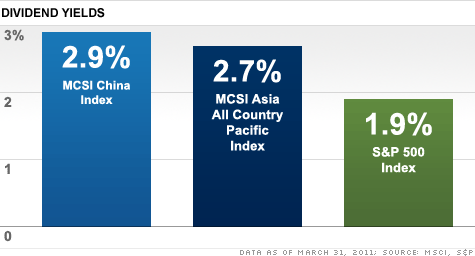Search News

To capture China's robust growth and buffer against accounting shams, experts recommend investing in Chinese companies that pay regular dividends.
NEW YORK (CNNMoney) -- Investing in China is fraught with risk but there are strategies that can help investors avoid getting burned.
The bulk of Chinese companies that have been embroiled in recent scandals have been firms that list their shares on exchanges in the United States or Canada though so-called reverse mergers.
Take Hong Kong-based tree plantation operator Sino-Forest (SNOFF), for example.
Even John Paulson, who made billions betting against the housing market during the bubble, fell victim to Sino Forest's alleged fraud after short-selling firm Muddy Waters published a report claiming that the company has been misrepresenting its finances to investors.
"I overwhelmingly prefer H-shares, which trade in Hong Kong, or A-Shares, which trade on China's stock exchanges," said Anthony Cragg, portfolio manager of the Wells Fargo Advantage Asia Pacific Fund (SASPX). "The selection of companies that are listed outside of China and Hong Kong is pretty poor, with the exception of a few names like Baidu (BIDU) and Sina Corp. (SINA)"
Cragg is a fan of Chinese banks like Industrial and Commercial Bank of China (IDCBY), insurance companies including China Life (LFC), power plant operator Huaneng Power International (HNP), and energy companies China Petroleum (SNP) and PetroChina (PTR).
"These companies are the blue chips of China," said Cragg. "They have been around for a while, have been stress tested and are followed by many analysts. If you look at some of the companies that have blown up recently, the analyst coverage around them was thin."
And while there's no foolproof strategy, Cragg also said that companies with a track record of paying dividends are good bets.
Portfolio managers Bruce Brewington and Jesper Madsen only invest in Chinese companies that pay dividends. They say the strategy allows investors to capture China's robust growth, while providing a buffer against accounting shams.
"If companies can pay out dividends, that means they are generating earnings," said Madsen, who manages the Matthews China Dividend Fund (MCDFX). The fund's top holding is China Mobile (CHL), which pays a 4.2% annual dividend.
On average, Chinese companies offer a dividend yield of 3% while the average dividend payout of S&P 500 companies stands at about 2%.
"A lot of public companies in emerging markets like China are owned by a single individual or family, so the one way they get paid is through dividends," said Brewington, who manages the Forward International Dividend Fund (FFINX).
Brewington says the Chinese banking sector, which incidentally pays healthy dividends, is due for a bounce after staging a bit of a retreat as China raised its reserve requirements in an effort to rein in inflation.
He noted that the Agricultural Bank of China (ACGBY) is in a particularly unique position to grow as China starts to focus on shifting economic activity from the coast to the central and western regions of China, where ABC already boasts a strong presence.
The bank already pays a dividend of 3%, and that's likely to grow. ![]()
| Index | Last | Change | % Change |
|---|---|---|---|
| Dow | 32,627.97 | -234.33 | -0.71% |
| Nasdaq | 13,215.24 | 99.07 | 0.76% |
| S&P 500 | 3,913.10 | -2.36 | -0.06% |
| Treasuries | 1.73 | 0.00 | 0.12% |
| Company | Price | Change | % Change |
|---|---|---|---|
| Ford Motor Co | 8.29 | 0.05 | 0.61% |
| Advanced Micro Devic... | 54.59 | 0.70 | 1.30% |
| Cisco Systems Inc | 47.49 | -2.44 | -4.89% |
| General Electric Co | 13.00 | -0.16 | -1.22% |
| Kraft Heinz Co | 27.84 | -2.20 | -7.32% |
| Overnight Avg Rate | Latest | Change | Last Week |
|---|---|---|---|
| 30 yr fixed | 3.80% | 3.88% | |
| 15 yr fixed | 3.20% | 3.23% | |
| 5/1 ARM | 3.84% | 3.88% | |
| 30 yr refi | 3.82% | 3.93% | |
| 15 yr refi | 3.20% | 3.23% |
Today's featured rates: